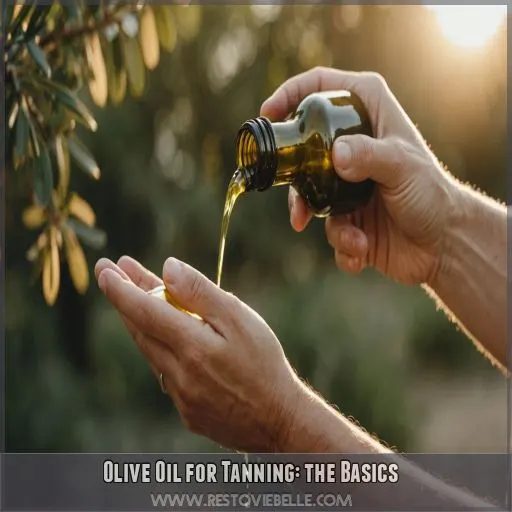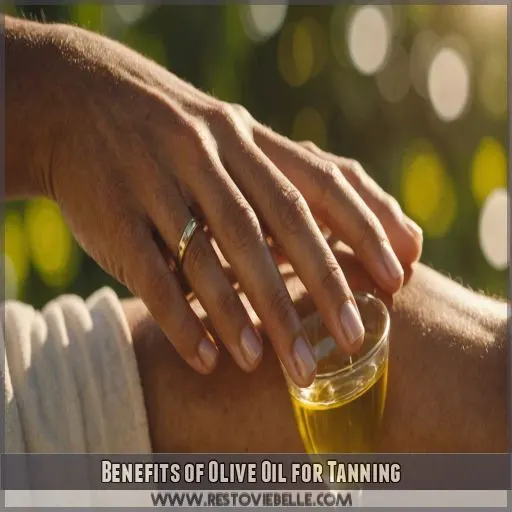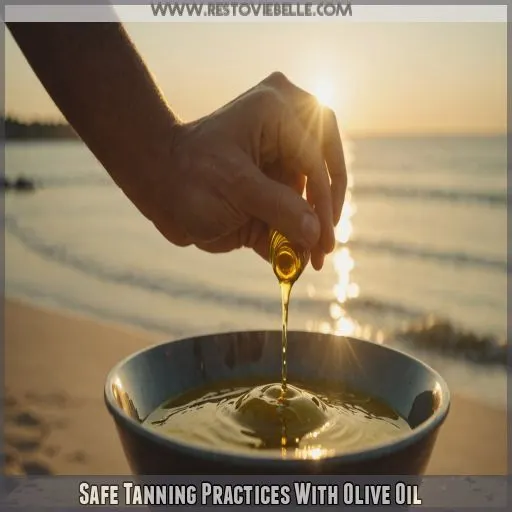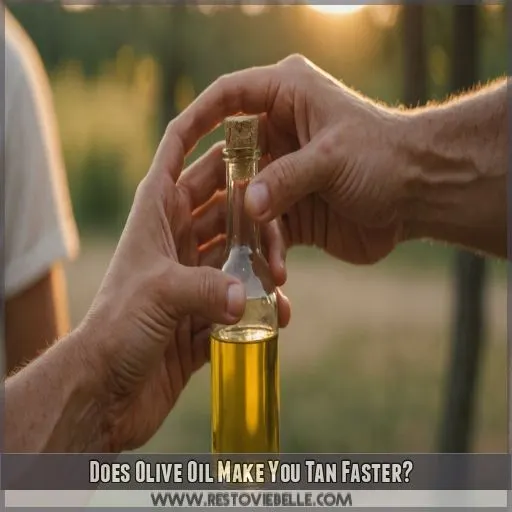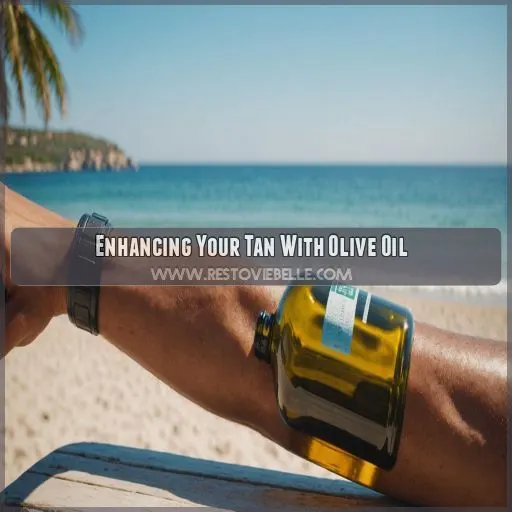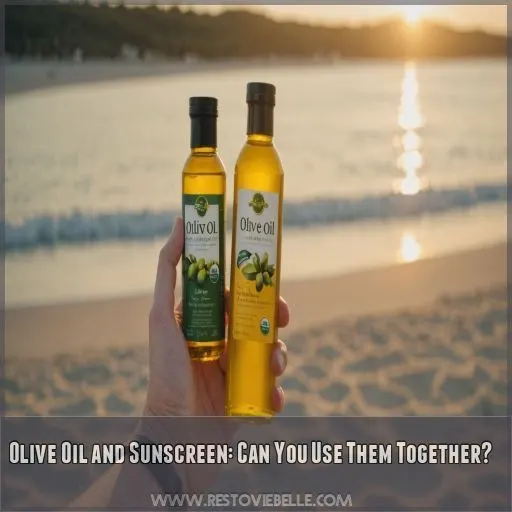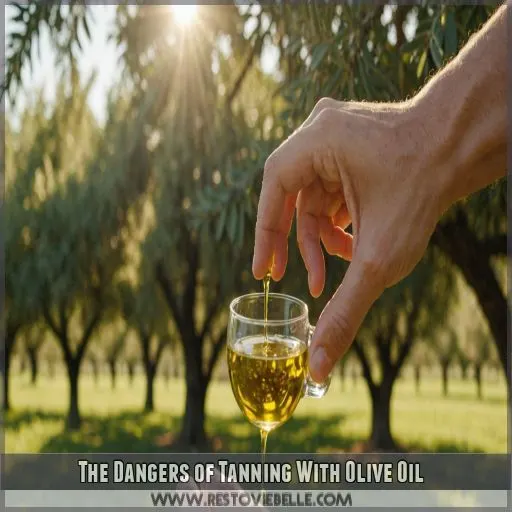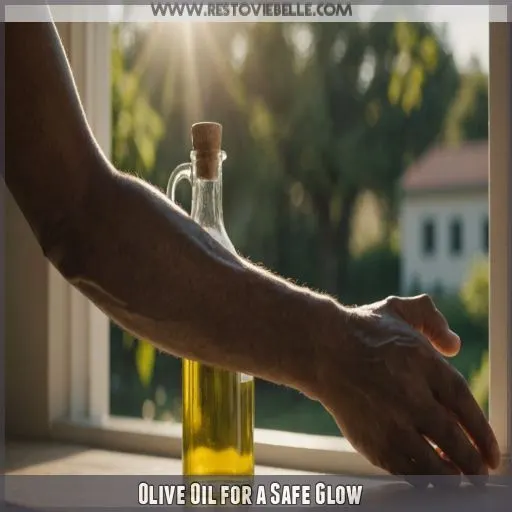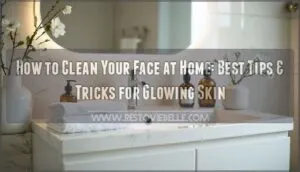This site is supported by our readers. We may earn a commission, at no cost to you, if you purchase through links.
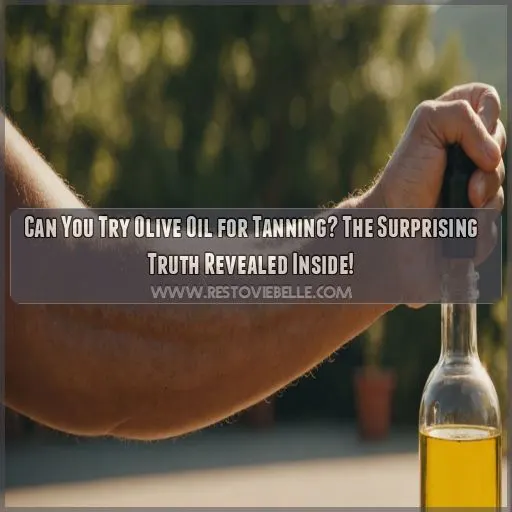
While it’s true that olive oil can enhance your tan by attracting UV rays and speeding up melanin production, it’s not a substitute for sunscreen.
Think of it as a double-edged sword: you might get that sun-kissed glow faster, but you’re also increasing your risk of sun damage.
Olive oil’s moisturizing properties can leave your skin feeling silky smooth, but it won’t protect you from harmful rays.
If you’re determined to give it a go, always pair it with a high-SPF sunscreen.
Ready to uncover the whole truth about olive oil tanning?
Table Of Contents
- Key Takeaways
- Olive Oil for Tanning: the Basics
- Benefits of Olive Oil for Tanning
- Safe Tanning Practices With Olive Oil
- Does Olive Oil Make You Tan Faster?
- Enhancing Your Tan With Olive Oil
- Olive Oil and Sunscreen: Can You Use Them Together?
- The Dangers of Tanning With Olive Oil
- Olive Oil for a Safe Glow
- Using Olive Oil for Tanning: Best Practices
- Frequently Asked Questions (FAQs)
- Can you use olive oil as tanning oil?
- Which oil makes you tan faster?
- Is olive skin good for tanning?
- Can I use olive oil as sunscreen?
- Can olive oil prevent sunburn while tanning?
- How long does an olive oil tan last?
- Is extra virgin olive oil better for tanning?
- Can olive oil remove existing tans or tan lines?
- Does olive oil tanning work on all skin types?
- Conclusion
Key Takeaways
- Olive oil might be your ticket to a quicker tan, but it’s no magic shield against the sun’s wrath. Think of it as a double-edged sword: faster glow, but also faster "ouch!"
- When it comes to sun protection, olive oil is about as useful as a chocolate teapot. Always slap on that SPF 30+ sunscreen, unless you fancy looking like a wrinkly tomato in your golden years.
- If you’re dead set on the olive oil tanning train, at least hop aboard safely. Exfoliate first, apply it generously, and for the love of your skin, don’t forget to reapply sunscreen every two hours. Your future self will thank you!
- Want a sun-kissed glow without the sun damage drama? Try whipping up a DIY Self-Tanner with coffee grounds and olive oil. It’s like a spa day and a beach day had a baby, minus the sunburn!
Olive Oil for Tanning: the Basics
You’re probably wondering if olive oil can help you get a sun-kissed glow without the damage. Let’s break down the basics of using olive oil for tanning, and separate fact from fiction to make sure you’re protecting your skin while still getting the tan you want.
How Olive Oil Enhances Tanning
olive oil can enhance tanning by moisturizing and nourishing your skin, creating a protective barrier, and attracting UV rays. But remember, it’s not a substitute for sunscreen!
- Nourishes and moisturizes your skin for a healthy glow
- Creates a protective barrier against dryness and damage
- Attracts UV rays for a deeper tan
- Can be used as a natural alternative to tanning oils
- Always use sunscreen with at least SPF 30 for protection against Skin Cancer and premature aging
The Science Behind Olive Oil and UV Rays
when you apply olive oil to your skin, it lowers the refractive index, allowing more UV rays to penetrate. This increases melanin production, resulting in a darker tan. However, olive oil doesn’t offer any sun protection, so don’t rely on it as a substitute for sunscreen with SPF 30+ protection against UVA and UVB rays.
Olive Oil Vs. Tanning Oils
Considering olive oil for tanning? It’s a natural alternative to traditional tanning oils, but don’t rely solely on it for sun protection. Olive oil lacks SPF, making it less effective against UV rays and sun damage. Use it to moisturize and enhance your tan, but always pair it with a broad-spectrum sunscreen for safe and effective protection.
Benefits of Olive Oil for Tanning
You’re considering using olive oil for tanning, but before you slather it on, let’s explore the benefits it can bring to your skin. Olive oil can moisturize and nourish your skin, create a protective barrier, and even provide antioxidant power for a healthy glow – but can it really help you achieve that sun-kissed look?
Moisturizing and Nourishing the Skin
When you’re tanning, your skin needs all the hydration it can get. That’s where olive oil comes in – rich in healthy fats, it nourishes and moisturizes your skin. By adding olive oil to your skin care routine, you’ll get a better tan and softer, more supple skin that glows with health.
Creating a Protective Barrier
Here’s the deal – olive oil creates a protective barrier that locks in moisture and helps shield your skin from environmental stressors. By applying olive oil before tanning, you’re basically giving your skin a hydration boost and a natural layer of protection against UV radiation. Just remember, olive oil isn’t a substitute for sunscreen with SPF 30+!
Antioxidant Power for a Healthy Glow
olive oil is rich in antioxidants, which help fight free radicals and reduce inflammation. This means you get a healthy glow, not just a tan. Vitamin E in olive oil also shields your skin from damage. So, go ahead and use olive oil to nourish your skin, but don’t forget your sunscreen – it’s still essential for sun protection!
Safe Tanning Practices With Olive Oil
You want that sun-kissed glow, but you want to do it safely – and you’re wondering if olive oil can help. While olive oil can help moisturize and nourish your skin, you need to use it with proven sun protection methods to avoid premature aging and skin cancer risks.
Exfoliating for an Even Tan
You’re ready to get your tan on! Before applying olive oil, exfoliate your skin to remove dead cells and get a nice even tan. Use gentle methods like sugar scrubs or exfoliating tools, and don’t forget to moisturize after exfoliating. Here are some tips to get you started:
- Exfoliate 1-2 times a week for the best results.
- Use a sugar scrub with almond oil for a gentle exfoliating experience.
- Focus on rough areas like elbows and knees.
- Moisturize after exfoliating to keep your skin hydrated and ready for tanning.
Applying Olive Oil for Maximum Benefit
When applying olive oil for tanning, timing is everything. Exfoliate your skin first, then massage a generous amount of high-quality olive oil into dry areas. Allow it to absorb for a few minutes before sun exposure. For best results, use extra virgin olive oil, which is rich in antioxidants and healthy fats that nourish and moisturize your skin.
Sun Protection Essentials
Now that you’re applying olive oil for maximum benefit, don’t forget the sun protection essentials. You still need sunscreen with at least SPF 30, even with olive oil. Reapply every two hours, and take breaks in the shade. Remember, olive oil isn’t a substitute for sunscreen. Stay safe, and enjoy your sun-kissed glow without the burn.
Does Olive Oil Make You Tan Faster?
You’re wondering if olive oil can help you tan faster.
The answer is a bit complicated.
While olive oil can lower your skin’s refractive index, allowing more UV rays to penetrate and potentially speeding up melanin production, you need to remember that it doesn’t offer any sun protection.
Be sure to use it in conjunction with a broad-spectrum sunscreen.
How Olive Oil Lowers Refractive Index
When you apply olive oil to your skin, it lowers the refractive index, allowing more UV rays to penetrate.
This is because olive oil’s composition changes the way your skin reflects light.
As a result, your skin absorbs more UV radiation, which can stimulate melanin production.
However, remember that olive oil doesn’t offer any sun protection, unlike some commercial tanning oils.
Increased UV Exposure for Faster Tanning
You’ve probably heard that olive oil can help you tan faster. It’s true – olive oil can make your skin absorb more UV rays, leading to a darker tan. But, like any good thing, there’s a catch. More UV rays also mean a higher risk of sunburn and skin cancer.
Here are 4 things to keep in mind:
- Sun protection is a must: Always wear sunscreen with at least SPF 30.
- Tanning time varies: Olive oil can speed up your tan, but pay attention to your skin type and how much sun you’re getting.
- Skip the tanning beds: They seriously increase your risk of skin cancer and make you look older faster.
- Moisturize after tanning: Use olive oil to lock in moisture and soothe your skin.
The Role of Melanin in Olive Skin
You’ve got olive skin, and you’re wondering if olive oil can help you tan faster. Let’s break it down. Melanin production plays a key role in olive skin tone. Here’s a quick rundown:
| Olive Skin Characteristics | Tanning Effects |
|---|---|
| Higher melanin production | Natural protection against UV radiation |
| Increased UV sensitivity | May require more sun exposure to tan |
| Longer tanning time | Can lead to a deeper, more even tan |
| Greater risk of hyperpigmentation | Be cautious with sun protection and tanning time |
Enhancing Your Tan With Olive Oil
You’re probably wondering if olive oil can actually help you achieve a deeper, more radiant tan. While it’s not a substitute for sunscreen, olive oil can indeed play a role in enhancing your tan, but only if you use it correctly and combine it with proper sun protection.
Attracting and Intensifying UV Rays
Here’s the deal – using olive oil for tanning can actually attract and intensify UV rays, which can enhance your tan. However, be cautious – this increased UV exposure can also lead to sun damage and skin cancer. To stay safe, always pair olive oil with a broad-spectrum sunscreen (at least SPF 30) and follow safe tanning practices.
Locking in Moisture for a Deeper Tan
To get a deeper tan, lock in moisture with olive oil. Here are three tips to help:
- Hydrate your skin: Apply olive oil after exfoliating to create a silky smooth skin barrier.
- Protect your skin: Use olive oil in addition to sunscreen for the best sun protection.
- Moisturize regularly: Reapply olive oil after tanning to maintain hydration and a healthy glow.
Combining Olive Oil With Other Natural Ingredients
Want to supercharge your tan? Mix olive oil with other natural ingredients like aloe vera, coffee grounds, or coconut oil for a DIY tanning recipe. These combos can enhance your glow while nourishing your skin. Just remember, olive oil isn’t a sunscreen substitute, so always apply a broad-spectrum sunscreen with at least SPF 30 before tanning.
Olive Oil and Sunscreen: Can You Use Them Together?
You’re probably wondering if you can use olive oil and sunscreen together to get a sun-kissed glow while still protecting your skin. The answer is a bit more complicated than a simple yes or no, as it depends on the type of sunscreen you’re using and how you apply it with olive oil.
Interference With Chemical-Based Sunscreens
When using olive oil for tanning, be aware that it may interfere with chemical-based sunscreens. The olive oil barrier can prevent the sunscreen from absorbing properly, reducing its effectiveness. To stay safe, opt for mineral-based sunscreens or apply sunscreen liberally and reapply often. Don’t rely solely on olive oil for sun protection – your skin’s health is worth it!
Using Mineral-Based Sunscreens With Olive Oil
Using mineral-based sunscreens with olive oil is a safer bet. These sunscreens work by physically deflecting UV rays, not by absorption, so olive oil won’t interfere with their effectiveness. Here are some tips to keep in mind:
- Choose a broad-spectrum mineral-based sunscreen with zinc oxide or titanium dioxide.
- Apply sunscreen liberally before using olive oil.
- Use a small amount of olive oil, just enough to moisturize your skin.
- Reapply sunscreen every two hours, or immediately after swimming or sweating.
Applying Sunscreen Liberally and Reapplying Often
When using olive oil for tanning, don’t forget to apply sunscreen liberally and reapply every two hours. Choose a broad-spectrum sunscreen with at least SPF 30 and reapply after swimming or sweating. Don’t rely on olive oil for sun protection – it’s not a substitute for sunscreen. Stay sun-safe and enjoy your glow!
The Dangers of Tanning With Olive Oil
You might be tempted to use olive oil as a shortcut to a sun-kissed glow, but the truth is, it’s not worth the risks. Tanning with olive oil can lead to serious sun damage, premature aging, and even skin cancer – and that’s not a price you want to pay for a temporary tan.
Sun Damage and Free Radical Production
You might think olive oil is your ticket to a golden glow, but hold your horses!
While it’s great for your salad, using it for tanning is like inviting trouble to your skin party.
Sun exposure triggers a cascade of free radicals, those pesky molecules that wreak havoc on your skin cells.
It’s like sending an army of tiny troublemakers to attack your DNA.
Yikes!
Skin Cancer Risks and Premature Aging
You might think olive oil is your skin’s best friend, but for tanning, it’s more like a wolf in sheep’s clothing.
While it may give you that golden glow you’re after, it’s also rolling out the red carpet for skin cancer and premature aging.
Think of it this way: every tan is your skin’s SOS signal, crying out for help against UV damage.
The Importance of Sun Protection
Given the risks of skin cancer and premature aging, sun protection is non-negotiable.
Don’t let the allure of a golden tan cloud your judgment.
Slathering on olive oil without sunscreen is like stepping onto a tightrope without a safety net.
Instead, arm yourself with broad-spectrum SPF 30+ sunscreen, your skin’s best friend.
Olive Oil for a Safe Glow
If you’re looking for a safer way to achieve a sun-kissed glow, olive oil might surprise you with its versatility. Let’s explore how this kitchen staple can be your secret weapon for a natural-looking tan, minus the harmful UV rays.
DIY Self-Tanning With Coffee Grounds and Olive Oil
Want a safe, sun-free glow? Try this DIY coffee and olive oil tanner!
Mix a cup each of coffee grounds and olive oil, let it sit for 5-10 minutes.
In the shower, gently scrub it on your skin for a few minutes.
Let it work its magic for another 5-10 minutes, then rinse off.
Repeat 2-3 times a week for a subtle bronze without the sun damage.
It’s your ticket to a beach-ready look, minus the burn!
Alternative Tanning Methods for a Subtle Bronze
Looking for a sun-kissed glow without the risks? Try these alternative tanning methods for a subtle bronze:
- Whip up a DIY tanner with carrot juice and olive oil
- Opt for a professional spray tan for an even, natural-looking result
- Use a gradual tanner lotion for a slow, buildable color
These options give you control over your tan without harmful UV exposure. Plus, they’re perfect for those days when you want to look like you’ve been lounging on a tropical beach!
Maintaining a Healthy Glow With Olive Oil
Now that you’ve got your subtle bronze glow, let’s keep it going!
Olive oil isn’t just for cooking – it’s your skin’s new best friend.
After your DIY tanning session, slather on some extra virgin olive oil to lock in moisture and maintain that sun-kissed look.
Mix it with a few drops of lavender essential oil for a spa-like experience.
Using Olive Oil for Tanning: Best Practices
If you’re thinking about using olive oil for tanning, it’s important to know the best ways to do it safely and effectively. Let’s talk about how to pick the right olive oil and when to use it to get the best results, all while keeping your skin healthy.
Choosing the Right Olive Oil for Tanning
If you’re looking for olive oil to help with tanning, extra virgin is the way to go.
It’s like the best of the best when it comes to olives!
Look for cold-pressed and organic varieties, as they’re packed with more skin-loving nutrients.
Steer clear of refined olive oil – it’s been stripped of its superpowers.
Just don’t forget, no matter how fancy your oil, it’s not a sunscreen substitute!
Applying Olive Oil at the Right Time
For best results, apply olive oil about 15 minutes before sun exposure.
This gives your skin time to soak up the goodness.
Don’t forget to reapply after swimming or sweating – your skin’s thirsty work isn’t done!
Post-tan, slather on more oil to lock in that glow and keep your skin happy.
Frequently Asked Questions (FAQs)
Can you use olive oil as tanning oil?
While olive oil might seem like a golden ticket to a sun-kissed glow, it’s not your safest bet. You can use it, but it won’t shield you from harmful rays. Stick to sunscreen for protection and a healthy tan.
Which oil makes you tan faster?
While some oils might speed up tanning, they won’t protect you from harmful UV rays. Instead of chasing a quick tan, focus on sun safety. Your skin’s health is worth more than any bronze glow!
Is olive skin good for tanning?
Your olive skin‘s natural melanin gives you a head start, but don’t skip the sunscreen! You’ll tan more easily, but still need protection. Embrace your skin’s built-in SPF while keeping it safe and glowing.
Can I use olive oil as sunscreen?
No, you shouldn’t use olive oil as sunscreen. It won’t protect you from harmful UV rays. While it’s great for your skin, it’s not a sunscreen substitute. Stick to SPF 30+ for safe sun fun!
Can olive oil prevent sunburn while tanning?
You might think olive oil’s a natural sunscreen, but it won’t prevent sunburn. While it moisturizes, it doesn’t block UV rays. Stick to real sunscreen for protection. Olive oil’s great for skin, just not as a sun shield.
How long does an olive oil tan last?
Your olive oil tan won’t last long, typically fading within a week. It’s not a true tan, just a temporary glow. For a safer, longer-lasting bronze, try self-tanners. Remember, sun protection is key for healthy skin!
Is extra virgin olive oil better for tanning?
While extra virgin olive oil might seem like a luxurious tanning option, it’s not recommended. You’re better off using a proper sunscreen. Keep your skin safe and glowing without risking damage from harmful UV rays.
Can olive oil remove existing tans or tan lines?
Like trying to erase a permanent marker, olive oil won’t remove existing tans or tan lines. It’s not a magic eraser for your skin. Instead, focus on protecting your skin and letting the tan fade naturally over time.
Does olive oil tanning work on all skin types?
While olive oil can enhance tanning for various skin types, it’s not a one-size-fits-all solution. Your skin’s natural melanin levels play a big role. Remember, olive oil isn’t a sunscreen substitute – always protect your skin!
Conclusion
Using olive oil for tanning is tricky.
While it can give you a nice glow, it’s not a magic solution.
If you decide to try olive oil for tanning, always use high-SPF protection and don’t stay in the sun too long.
In the end, the safest tan is one you get from self-tanning products or gradual sun exposure with proper protection.
Your skin’s health should always be your top priority.

